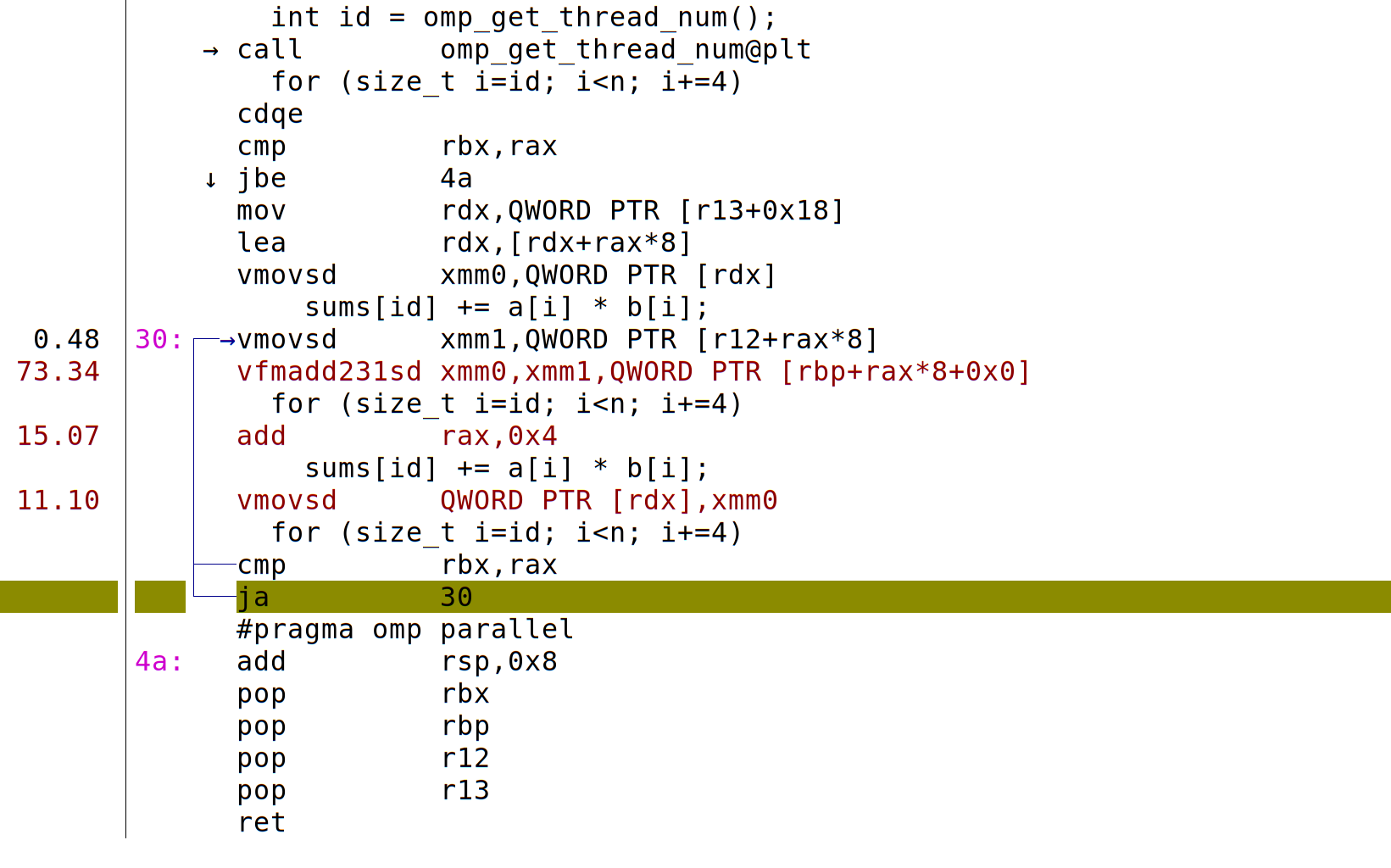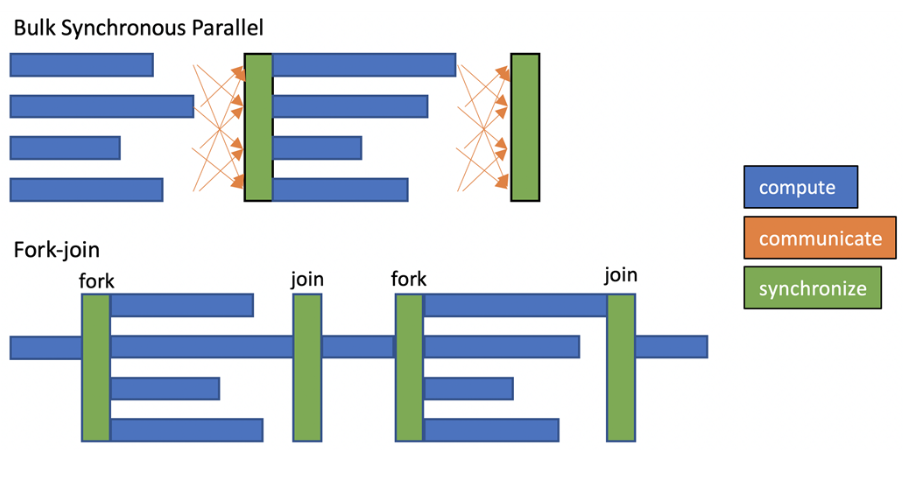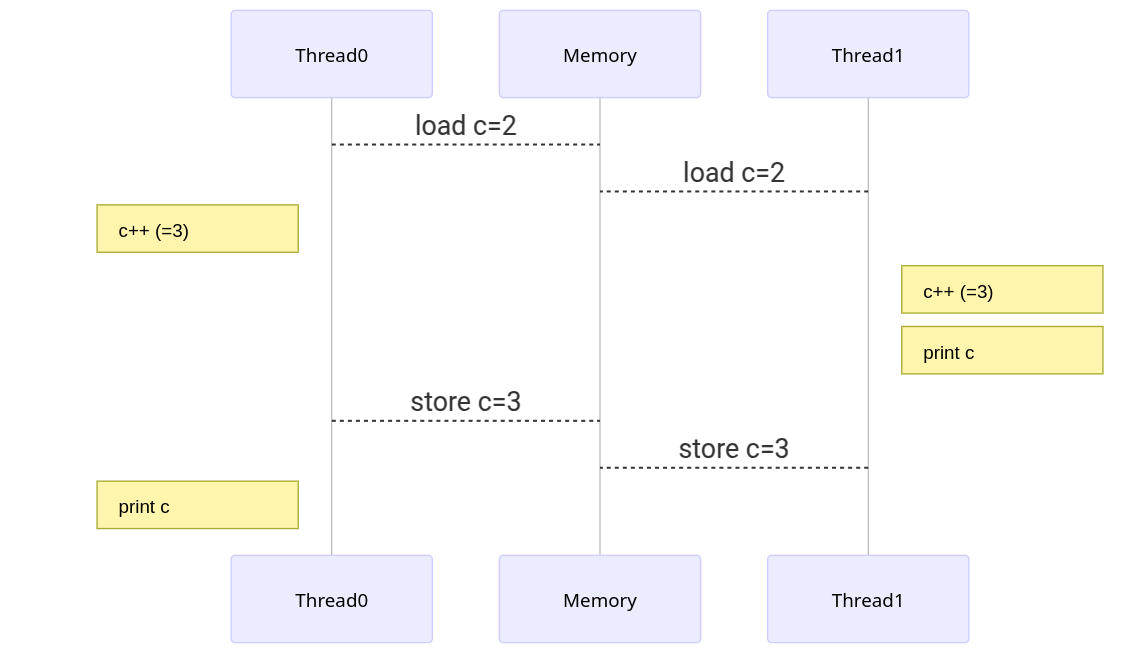13) More on OpenMP and OpenMP Tasks#
Last time:
OpenMP Basics
#pragma omp parallel#pragma omp simd
Today:
1. More on OpenMP#
What does the compiler do when we add the #pragma openmp parallel directive?
static double dot_opt3(size_t n, const double *a, const double *b) {
double sum = 0;
omp_set_num_threads(4);
#pragma omp parallel
{
#pragma omp for reduction(+:sum)
for (size_t i=0; i<n; i++)
sum += a[i] * b[i];
}
return sum;
}
! gcc -Os -march=native -fopenmp ../c_codes/module3-3/dot.c -o dot
! objdump -d --prefix-addresses -M intel dot | grep dot_opt3
0000000000001379 <main+0x1b9> call 000000000000184c <dot_opt3>
000000000000184c <dot_opt3> push r12
000000000000184e <dot_opt3+0x2> mov r12,rdx
0000000000001851 <dot_opt3+0x5> push rbp
0000000000001852 <dot_opt3+0x6> mov rbp,rsi
0000000000001855 <dot_opt3+0x9> push rbx
0000000000001856 <dot_opt3+0xa> mov rbx,rdi
0000000000001859 <dot_opt3+0xd> mov edi,0x4
000000000000185e <dot_opt3+0x12> sub rsp,0x30
0000000000001862 <dot_opt3+0x16> mov rax,QWORD PTR fs:0x28
000000000000186b <dot_opt3+0x1f> mov QWORD PTR [rsp+0x28],rax
0000000000001870 <dot_opt3+0x24> xor eax,eax
0000000000001872 <dot_opt3+0x26> call 0000000000001140 <omp_set_num_threads@plt>
0000000000001877 <dot_opt3+0x2b> xor ecx,ecx
0000000000001879 <dot_opt3+0x2d> xor edx,edx
000000000000187b <dot_opt3+0x2f> lea rsi,[rsp+0x8]
0000000000001880 <dot_opt3+0x34> lea rdi,[rip+0xc4] # 000000000000194b <dot_opt3._omp_fn.0>
0000000000001887 <dot_opt3+0x3b> mov QWORD PTR [rsp+0x18],r12
000000000000188c <dot_opt3+0x40> mov QWORD PTR [rsp+0x10],rbp
0000000000001891 <dot_opt3+0x45> mov QWORD PTR [rsp+0x8],rbx
0000000000001896 <dot_opt3+0x4a> mov QWORD PTR [rsp+0x20],0x0
000000000000189f <dot_opt3+0x53> call 00000000000011b0 <GOMP_parallel@plt>
00000000000018a4 <dot_opt3+0x58> vmovsd xmm0,QWORD PTR [rsp+0x20]
00000000000018aa <dot_opt3+0x5e> mov rax,QWORD PTR [rsp+0x28]
00000000000018af <dot_opt3+0x63> sub rax,QWORD PTR fs:0x28
00000000000018b8 <dot_opt3+0x6c> je 00000000000018bf <dot_opt3+0x73>
00000000000018ba <dot_opt3+0x6e> call 0000000000001150 <__stack_chk_fail@plt>
00000000000018bf <dot_opt3+0x73> add rsp,0x30
00000000000018c3 <dot_opt3+0x77> pop rbx
00000000000018c4 <dot_opt3+0x78> pop rbp
00000000000018c5 <dot_opt3+0x79> pop r12
00000000000018c7 <dot_opt3+0x7b> ret
000000000000194b <dot_opt3._omp_fn.0> endbr64
000000000000194f <dot_opt3._omp_fn.0+0x4> push r14
0000000000001951 <dot_opt3._omp_fn.0+0x6> mov r14,QWORD PTR [rdi+0x8]
0000000000001955 <dot_opt3._omp_fn.0+0xa> push r13
0000000000001957 <dot_opt3._omp_fn.0+0xc> mov r13,QWORD PTR [rdi+0x10]
000000000000195b <dot_opt3._omp_fn.0+0x10> push r12
000000000000195d <dot_opt3._omp_fn.0+0x12> push rbp
000000000000195e <dot_opt3._omp_fn.0+0x13> mov rbp,rdi
0000000000001961 <dot_opt3._omp_fn.0+0x16> push rbx
0000000000001962 <dot_opt3._omp_fn.0+0x17> mov rbx,QWORD PTR [rdi]
0000000000001965 <dot_opt3._omp_fn.0+0x1a> test rbx,rbx
0000000000001968 <dot_opt3._omp_fn.0+0x1d> jne 0000000000001999 <dot_opt3._omp_fn.0+0x4e>
000000000000196a <dot_opt3._omp_fn.0+0x1f> vxorpd xmm0,xmm0,xmm0
000000000000196e <dot_opt3._omp_fn.0+0x23> mov rdx,QWORD PTR [rbp+0x18]
0000000000001972 <dot_opt3._omp_fn.0+0x27> lea rcx,[rbp+0x18]
0000000000001976 <dot_opt3._omp_fn.0+0x2b> vmovq xmm3,rdx
000000000000197b <dot_opt3._omp_fn.0+0x30> mov rax,rdx
000000000000197e <dot_opt3._omp_fn.0+0x33> vaddsd xmm2,xmm0,xmm3
0000000000001982 <dot_opt3._omp_fn.0+0x37> vmovq rsi,xmm2
0000000000001987 <dot_opt3._omp_fn.0+0x3c> lock cmpxchg QWORD PTR [rcx],rsi
000000000000198c <dot_opt3._omp_fn.0+0x41> mov rsi,rdx
000000000000198f <dot_opt3._omp_fn.0+0x44> mov rdx,rax
0000000000001992 <dot_opt3._omp_fn.0+0x47> cmp rsi,rax
0000000000001995 <dot_opt3._omp_fn.0+0x4a> je 00000000000019ee <dot_opt3._omp_fn.0+0xa3>
0000000000001997 <dot_opt3._omp_fn.0+0x4c> jmp 0000000000001976 <dot_opt3._omp_fn.0+0x2b>
0000000000001999 <dot_opt3._omp_fn.0+0x4e> call 0000000000001170 <omp_get_num_threads@plt>
000000000000199e <dot_opt3._omp_fn.0+0x53> mov r12d,eax
00000000000019a1 <dot_opt3._omp_fn.0+0x56> call 0000000000001130 <omp_get_thread_num@plt>
00000000000019a6 <dot_opt3._omp_fn.0+0x5b> xor edx,edx
00000000000019a8 <dot_opt3._omp_fn.0+0x5d> movsxd rsi,r12d
00000000000019ab <dot_opt3._omp_fn.0+0x60> movsxd rcx,eax
00000000000019ae <dot_opt3._omp_fn.0+0x63> mov rax,rbx
00000000000019b1 <dot_opt3._omp_fn.0+0x66> div rsi
00000000000019b4 <dot_opt3._omp_fn.0+0x69> cmp rcx,rdx
00000000000019b7 <dot_opt3._omp_fn.0+0x6c> jb 00000000000019e7 <dot_opt3._omp_fn.0+0x9c>
00000000000019b9 <dot_opt3._omp_fn.0+0x6e> imul rcx,rax
00000000000019bd <dot_opt3._omp_fn.0+0x72> vxorpd xmm0,xmm0,xmm0
00000000000019c1 <dot_opt3._omp_fn.0+0x76> add rdx,rcx
00000000000019c4 <dot_opt3._omp_fn.0+0x79> add rax,rdx
00000000000019c7 <dot_opt3._omp_fn.0+0x7c> cmp rdx,rax
00000000000019ca <dot_opt3._omp_fn.0+0x7f> jae 000000000000196e <dot_opt3._omp_fn.0+0x23>
00000000000019cc <dot_opt3._omp_fn.0+0x81> vmovsd xmm1,QWORD PTR [r14+rdx*8]
00000000000019d2 <dot_opt3._omp_fn.0+0x87> vmulsd xmm1,xmm1,QWORD PTR [r13+rdx*8+0x0]
00000000000019d9 <dot_opt3._omp_fn.0+0x8e> inc rdx
00000000000019dc <dot_opt3._omp_fn.0+0x91> cmp rax,rdx
00000000000019df <dot_opt3._omp_fn.0+0x94> vaddsd xmm0,xmm0,xmm1
00000000000019e3 <dot_opt3._omp_fn.0+0x98> jne 00000000000019cc <dot_opt3._omp_fn.0+0x81>
00000000000019e5 <dot_opt3._omp_fn.0+0x9a> jmp 000000000000196e <dot_opt3._omp_fn.0+0x23>
00000000000019e7 <dot_opt3._omp_fn.0+0x9c> inc rax
00000000000019ea <dot_opt3._omp_fn.0+0x9f> xor edx,edx
00000000000019ec <dot_opt3._omp_fn.0+0xa1> jmp 00000000000019b9 <dot_opt3._omp_fn.0+0x6e>
00000000000019ee <dot_opt3._omp_fn.0+0xa3> pop rbx
00000000000019ef <dot_opt3._omp_fn.0+0xa4> pop rbp
00000000000019f0 <dot_opt3._omp_fn.0+0xa5> pop r12
00000000000019f2 <dot_opt3._omp_fn.0+0xa7> pop r13
00000000000019f4 <dot_opt3._omp_fn.0+0xa9> pop r14
00000000000019f6 <dot_opt3._omp_fn.0+0xab> ret
Anatomy of a parallel region#

Where GOMP stands for GNU Offloading and Multi-Processing Project (GOMP) and is an implementation of OpenMP and OpenACC for GNU compilers.
2. Memory semantics#
For each variable accessed within the parallel region, we can specify the following data-sharing policies:
private:
privateis the clause that contains the variables that each thread in the OpenMP parallel region will have a copy of. These copies are not initialised upon entering the parallel region.firstprivate: Like private, but by contrast,
firstprivatevariables are initialised with the value of the original variable upon entering the parallel region.lastprivate:
lastprivateis a clause that can be used in a parallelised loop or sections. Thelastprivateclause shares some of the semantics of the private clause. That is, each thread will have an uninitialised copy of the variables passed aslastprivate. However, unlike a private variable, at the end of the parallelised loop or sections, alastprivatevariable will take the value of the copy hosted at the thread that executed the last iteration (in the case of a parallelised loop) or section. The “last” iteration or section is the one that would be executed last if they were executed sequentially.shared:
sharedis the clause that contains the variables shared across the threads belonging to the OpenMP parallel region concerned. Such variables are therefore accessed concurrently, arising potential data-races.
int a=0, b=1, c=2;
#pragma omp parallel private(a) firstprivate(b) shared(c)
{
int id = omp_get_thread_num();
a++;
b++;
c++;
printf("[%d] %d %d %d\n", id, a, b, c);
}
printf("END: %d %d %d\n", a, b, c);
! gcc -fopenmp -Wall ../c_codes/module3-3/omp-mem.c -o omp-mem
Programming styles#
The private semantics is actually unnecessary and error-prone. We can just declare those variables at inner-most scope.
int b=1, c=2;
#pragma omp parallel firstprivate(b) shared(c)
{
int a = 0;
int id = omp_get_thread_num();
a++;
b++;
c++;
printf("[%d] %d %d %d\n", id, a, b, c);
}
printf("END: %d %d %d\n", a, b, c); // Error: a not in scope here
3. A quick demo on perf#
Linux perf is a kernel interrupt-based profiling tool. It uses performance counters and interrupts to diagnose all sorts of bottlenecks.
! perf stat ../c_codes/module3-3/dot -n 10000 > /dev/null
Error:
Access to performance monitoring and observability operations is limited.
Consider adjusting /proc/sys/kernel/perf_event_paranoid setting to open
access to performance monitoring and observability operations for processes
without CAP_PERFMON, CAP_SYS_PTRACE or CAP_SYS_ADMIN Linux capability.
More information can be found at 'Perf events and tool security' document:
https://www.kernel.org/doc/html/latest/admin-guide/perf-security.html
perf_event_paranoid setting is 4:
-1: Allow use of (almost) all events by all users
Ignore mlock limit after perf_event_mlock_kb without CAP_IPC_LOCK
>= 0: Disallow raw and ftrace function tracepoint access
>= 1: Disallow CPU event access
>= 2: Disallow kernel profiling
To make the adjusted perf_event_paranoid setting permanent preserve it
in /etc/sysctl.conf (e.g. kernel.perf_event_paranoid = <setting>)
! perf record -g ../c_codes/module3-3/dot -n 10000 -r 1000 > /dev/null
Error:
Access to performance monitoring and observability operations is limited.
Consider adjusting /proc/sys/kernel/perf_event_paranoid setting to open
access to performance monitoring and observability operations for processes
without CAP_PERFMON, CAP_SYS_PTRACE or CAP_SYS_ADMIN Linux capability.
More information can be found at 'Perf events and tool security' document:
https://www.kernel.org/doc/html/latest/admin-guide/perf-security.html
perf_event_paranoid setting is 4:
-1: Allow use of (almost) all events by all users
Ignore mlock limit after perf_event_mlock_kb without CAP_IPC_LOCK
>= 0: Disallow raw and ftrace function tracepoint access
>= 1: Disallow CPU event access
>= 2: Disallow kernel profiling
To make the adjusted perf_event_paranoid setting permanent preserve it
in /etc/sysctl.conf (e.g. kernel.perf_event_paranoid = <setting>)
! perf report -M intel
zero-sized data (perf.data), nothing to do!
Note how GOMP overhead dominates the cost in this experiment. We need more work (longer arrays, etc.) to justify the overhead of distributing and collecting the parallel work.
We can drill down into particular functions (especially those that we’ve written, which we have hopefully compiled with -g to include debugging information).

From this, we see specific instructions, and their corresponding lines of code, that are most frequently being processed when the kernel interrupts to check. In this experiment, we see *sd “scalar double” instructions, indicating lack of vectorization.
In contrast, the following annotation shows use of *pd “packed double” instructions, indicating that the “hot” loop has been vectorized.

The reason for vectorization can sometimes be determined by -fopt-info -fopt-info-missed, and can be encouraged by techniques like manually splitting accumulators, preventing aliasing by using restrict, directives like #pragma omp simd, and global compiler flags like -ffast-math (although, very dangerous to use).
Tip
For more on perf, see Brendan Gregg’s Linux Performance site.
4. OpenMP Tasks#
Tip
See this resource for OpenMP Task Parallelism.
Using #pragma omp task#
Up to now, we’ve been expressing parallelism for iterating over an array.
The application programmer specifies regions of code to be executed in a task with the
#pragma omp taskconstructAll tasks can be executed independently
When any thread encounters a task construct, a task is generated
Tasks are executed asynchronously by any thread of the parallel region
Completion of the tasks can be guaranteed using the
taskwaitsynchronization construct
1#include <stdio.h>
2int main() {
3 int x = 1;
4 #pragma omp parallel
5 #pragma omp single
6 {
7 #pragma omp task shared(x) depend(out: x)
8 x = 2;
9 #pragma omp task shared(x) depend(in: x)
10 printf("x + 1 = %d. ", x+1);
11 #pragma omp task shared(x) depend(in: x)
12 printf("x + 2 = %d. ", x+2);
13 }
14 puts("");
15 return 0;
16}
! gcc -fopenmp ../c_codes/module3-3/task_dep.4.c -o task_dep.4
! for i in {1..10}; do ./task_dep.4; done
x + 1 = 3. x + 2 = 4.
x + 2 = 4. x + 1 = 3.
x + 1 = 3. x + 2 = 4.
x + 2 = 4. x + 1 = 3.
x + 1 = 3. x + 2 = 4.
x + 2 = 4. x + 1 = 3.
x + 1 = 3. x + 2 = 4.
x + 1 = 3. x + 2 = 4.
x + 1 = 3. x + 2 = 4.
x + 1 = 3. x + 2 = 4.
The
singleconstruct specifies that the associated structured block is executed by only one of the threads in the team (not necessarily the master thread), in the context of its implicit task. The other threads in the team, which do not execute the block, wait at an implicit barrier at the end of thesingleconstruct unless anowaitclause is specified.The
dependclause allows you to provide information on the way a task will access dataIt is followed by an access mode that can be
in,outorinout. Examples:depend(in: x, y, z): the task will read variablesx,yandzdepend(out: res): the task will write variableres; Any previous value ofreswill be ignored and overwrittendepend(inout: k, buffer[0:n]): the task will both read and write the variableskandbuffer; the content ofnelements ofbufferstarting from index 0 will be used in the read-and-write
The OpenMP runtime system dynamically decides whether a task is ready for execution or not considering its dependencies (there is no need for further user intervention here).
1#include <stdio.h>
2int main() {
3 int x = 1;
4 #pragma omp parallel
5 #pragma omp single
6 {
7 #pragma omp task shared(x) depend(out: x)
8 x = 2;
9 #pragma omp task shared(x) depend(inout: x)
10 printf("x + 1 = %d. ", x+1);
11 #pragma omp task shared(x) depend(in: x)
12 printf("x + 2 = %d. ", x+2);
13 }
14 puts("");
15 return 0;
16}
! gcc -fopenmp ../c_codes/module3-3/task_dep.4inout.c -o task_dep.4inout
! for i in {1..10}; do ./task_dep.4inout; done
x + 1 = 3. x + 2 = 4.
x + 1 = 3. x + 2 = 4.
x + 1 = 3. x + 2 = 4.
x + 1 = 3. x + 2 = 4.
x + 1 = 3. x + 2 = 4.
x + 1 = 3. x + 2 = 4.
x + 1 = 3. x + 2 = 4.
x + 1 = 3. x + 2 = 4.
x + 1 = 3. x + 2 = 4.
x + 1 = 3. x + 2 = 4.
In general, creating tasks (even with only one thread) creates an expensive overhead.
The OpenMP loop scheduler#
When we put together the
#pragma omp parallel(which spawns a group of threads) and#pragma omp for(which divides loop iterations between the spawned threads) constructs, as in#pragma omp parallel forwe do both things at once.To this, you can optionally add
schedule(static,n), wherenis the chunk size that you want the tasks to be divided into for the threads. (Note: addingschedule(static,1)as in#pragma omp parallel for schedule(static,1)is equivalent to just#pragma omp parallel for)schedule(dynamic,n)still tells OpenMP to split task into size chunks, but distribute them to threads dynamically without any specific order.Check other options in this resource.
To fork/join or to task?#
One of the main issues in High-Performance Computing (HPC) systems is the underutilization of resources. Parallel applications partition and distribute compute and data across processors in the system that work together to solve a given problem. In this operation, processors synchronize and communicate which may lead to some of them spending time idle, waiting for other processors to complete their part. Idle processors mean wasted time and power. This can happen for serial sections of the code, load imbalance, or if you are waiting for synchronization.
These issues are common in bulk synchronous parallel applications, especially those that statically assign work to processors.
Many codes rely on bulk synchronous parallelization constructs to distribute and synchronize work across multiple threads in a system. In this model, multiple threads operate in parallel on different parts of a problem, and perform a global synchronization when the parallel work is completed.
Fork-join is a similar model where a single thread, sometimes called a master thread, is the application entry point. This forks into multiple threads that concurrently work on different parts of a problem, and then synchronize to join into a single thread when the work in the parallel section is complete (similar to the worksharing-parallel constructs in OpenMP that distribute the iterations in a loop across multiple threads).

Load imbalance appears when different threads receive an uneven amount of work to do, or perform the work at different speeds, leading to different amounts of compute time. In this scenario, the faster threads need to wait for lagging threads on global synchronizations, therefore being in an idle state and wasting resources during that time. In the fork-join model, serial sections in between parallel regions become an increasing bottleneck, as parallel regions are shortened with increasing numbers of threads.
A task is a piece of compute that operates on a piece of data and that may be executed concurrently with other tasks. This parallel programming abstraction is intuitive and allows to specify data-flow dependencies between tasks instead of costly global synchronizations. This mitigates idle time created as a result of load imbalance, given that threads pick up work as they complete, and there is also less time spent on serial sections due to the reduced number of global synchronizations.

For tasking to be efficient, it relies on overdecomposition, i.e., creating more work units than there are processing units. For many numerical algorithms, there is some overhead to overdecomposition. For example, in array processing of an array size \(n\), a halo/fringe/ghost/overlap region might need to be computed as part of each work patch, leading to time models along the lines of
where \(R\) is the processing rate.
Tip
Recommended reading: Tasking Lives Up to its Promises
